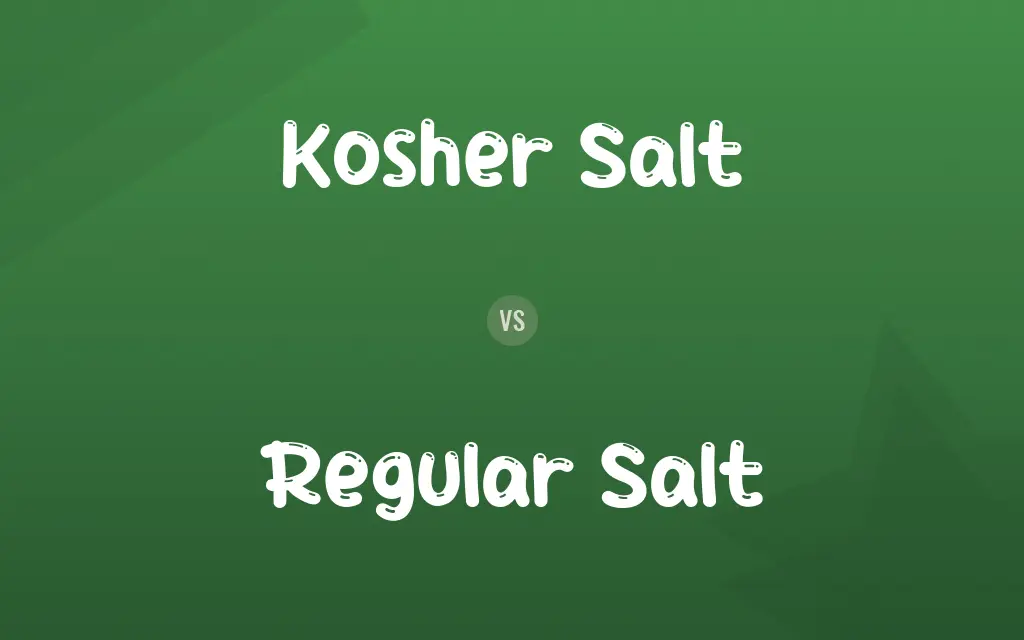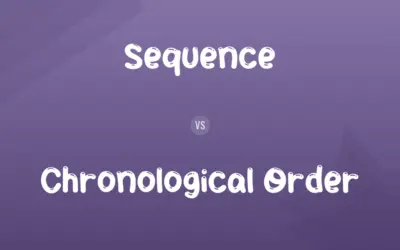Kosher Salt vs. Regular Salt: Difference and Comparison
Edited by Muazma Batool — By Muneeza Rehman — Published on December 12, 2023
Kosher salt has larger, flakier grains and no additives, while regular salt (table salt) has fine grains and often contains anti-caking agents.

Difference Between Kosher Salt and Regular Salt
Kosher salt and regular salt, while both primarily consist of sodium chloride, differ in texture, production methods, and uses. Kosher salt, characterized by its large, coarse grains, is free from additives, allowing it to impart a purer, brinier taste. In contrast, regular salt, also referred to as table salt, is finely grained and usually contains anti-caking agents, ensuring the salt flows smoothly without clumping.
Muneeza Rehman
Dec 12, 2023
The origins of kosher salt's name trace back to its use in koshering meat, a process that involves drawing out the blood from the meat as required by Jewish dietary laws. The larger grains of kosher salt are particularly effective at this, adhering to the meat's surface without dissolving rapidly. On the other hand, regular salt's fine granules are ideal for uniform blending in recipes and for direct consumption, as they dissolve more easily.
Muazma Batool
Dec 12, 2023
In cooking, the distinction between kosher salt and regular salt can make a significant difference. Due to the size of its grains, a teaspoon of kosher salt contains less actual salt than a teaspoon of regular salt. Hence, substituting one for the other in recipes might necessitate an adjustment in measurement. It's also worth noting that kosher salt provides a gentler, less salty flavor burst, making it a preferred choice for seasoning by many chefs.
Muneeza Rehman
Dec 12, 2023
From a nutritional standpoint, while the sodium content is largely the same, regular salt often has the added benefit of being iodized, introducing essential iodine into diets. This iodization arose from efforts to prevent iodine deficiencies in populations. Kosher salt, in its natural and additive-free form, usually lacks iodine unless specifically labeled as iodized.
Kaitlyn
Dec 12, 2023
Kosher Salt vs. Regular Salt Comparison Chart
Usage in Cooking
Less salty flavor burst, doesn't dissolve quickly
Dissolves easily, more uniformly seasoned food
Muneeza Rehman
Dec 12, 2023
Kosher Salt vs. Regular Salt Definitions
◉Kosher Salt
Preferred by many chefs for its pure and clean flavor profile.
The recipe specifically asked for kosher salt for seasoning.
Elijah
Sep 25, 2023
◉Regular Salt
Dissolves easily, making it ideal for a uniformly seasoned dish.
A dash of regular salt was perfect for the salad dressing.
Muneeza Rehman
Sep 25, 2023
◉Kosher Salt
A type of salt with larger, coarser grains free of additives.
The chef sprinkled kosher salt over the steak for a robust flavor.
Muneeza Rehman
Sep 25, 2023
◉Regular Salt
Finely grained salt, often with additives to prevent clumping.
Regular salt dissolved quickly in the soup, blending flavors seamlessly.
Muneeza Rehman
Sep 25, 2023
◉Kosher Salt
Doesn't contain iodine unless specified as iodized.
To ensure iodine intake, she checked if the kosher salt was iodized.
Henry
Sep 25, 2023
◉Regular Salt
Often iodized to introduce essential iodine into diets.
The regular salt was iodized, catering to dietary requirements.
Muazma Batool
Sep 25, 2023
◉Kosher Salt
Ideal for seasoning, providing a gentler, brinier taste.
She preferred using kosher salt for her homemade chips.
Muneeza Rehman
Sep 25, 2023
◉Regular Salt
Commonly used for direct consumption and in recipes.
She added a pinch of regular salt to her morning eggs.
Muneeza Rehman
Sep 25, 2023
◉Kosher Salt
Salt traditionally used in the koshering process of meat.
Kosher salt helped in drawing out the blood from the meat.
Muazma Batool
Sep 25, 2023
◉Regular Salt
Standard choice for table salt in households and restaurants.
A shaker filled with regular salt sat on every diner table.
Lucas
Sep 25, 2023
Kosher Salt vs. Regular Salt Frequently Asked Questions
Why do some chefs prefer kosher salt?
Its larger grains provide a purer, brinier taste and it doesn't contain additives.
Muneeza Rehman
Dec 12, 2023
Does regular salt always contain iodine?
No, but it's often iodized to prevent iodine deficiencies.
Lucas
Dec 12, 2023
Is the sodium content different between kosher salt and regular salt?
No, but due to grain size, volume measurements will differ in actual salt content.
Muazma Batool
Dec 12, 2023
Why does regular salt sometimes clump together?
It can absorb moisture, but anti-caking agents are added to prevent this.
Muneeza Rehman
Dec 12, 2023
Is kosher salt only used in Jewish cuisine?
No, it's widely used in various cuisines due to its flavor profile.
Nolan
Dec 12, 2023
What makes kosher salt "kosher"?
It's named for its use in the koshering process, not necessarily that it meets kosher dietary laws.
Muneeza Rehman
Dec 12, 2023
Is one type of salt healthier than the other?
Both are primarily sodium chloride; the choice is more about texture and taste.
Muneeza Rehman
Dec 12, 2023
Why is kosher salt grain size larger?
It's crafted to effectively draw out blood in the koshering process.
Lucas
Dec 12, 2023
Do both salts come from the sea?
Both can be derived from the sea, but the processing methods differ.
William
Dec 12, 2023
Can I directly substitute kosher salt for regular salt in recipes?
Not in equal measurements; due to grain size, you might need to adjust the amount.
Lucas
Dec 12, 2023
Content Creators
Written by
Muneeza RehmanAt Comparisons.wiki, Muneeza skillfully navigates the vast sea of information, ensuring clarity and accuracy as the lead content editor. With a keen eye for detail, she curates every comparison to enlighten and engage readers.
Edited by
Muazma BatoolAs a content editor, Muazma Batool is not just a grammar guru but a creative mastermind who breathes life into every word. With an eagle eye for detail and a passion for storytelling, she transforms bland text into engaging content that captivates audiences and drives results.

































